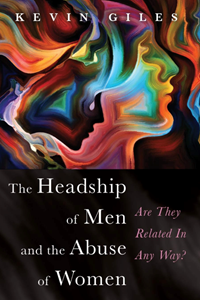Complementarianism and the Abusive Male

These are some facts: complementarians unequivocally denounce male abuse of females, complementarians claim their teachings are no more causative of abuse than the teaching of egalitarians, and leading complementarians overtly state their view is “biblical patriarchy.”
Kevin Giles, in his new book The Headship of Men and the Abuse of Women, adds this one: marriages that are flourishing among complementarians are actually far more egalitarian than is admitted. I don’t know how one measures such things but I’ve seen enough wonderful marriages of complementarians to have thought the same many times.
In this post we will look at male abuse of women and how that might be connected to present-day complementarianism or “patriarchy” or what Andreas Köstenberger calls “patricentrism” (father/male centeredness) [SMcK: amazing that one would use that term, but so it goes].
We begin with characteristics of abuse.
Ten characteristics of “angry and abusive men” from Lundy Bancroft’s book (Why Does He Do That?).
1. He is controlling.
2. He feels entitled.
3. He believes men and women are inherently different.
4. He is possessive.
5. He is frequently angered/enraged.
6. He twists things into the opposite [gaslighting].
7. He is manipulative.
8. He strives to have a good public image.
9. He justifies his behavior.
10. He uses sex to exert his power and to further his own goals.
So, whether it is verbal, emotional, psychological, social, financial, spiritual, sexual or physical abuse, these are at work in the abusive male.
What does this look like when boiled down? What are its keys?
It’s all about power. It’s all about entitlement. Threats of rage and violence shape the relationship.
But it’s not simply one man and one woman. There is a culture that contributes, an ideology, a worldview, a theology.
Historically, men’s abuse of and violence towards women have been explained primarily in individualistic terms. Such explanations find the cause in the psychology, mental health, or life experiences of perpetrators. While these personal factors may certainly play a part and should not be ignored, they are inadequate on their own. The scholarly consensus today is that behind all domestic abuse and violence lies a belief in male privilege and entitlement, and conversely, a low estimation of women, that usually reflects the values and ideas of the community in which people find themselves.
In other words, where communities believe that men are privileged and should be in charge and women submissive, women in much higher percentages are abused.
Professor Steven Tracy (a soft complentarian) has said: There is abundant data showing that conceptions of gender in which males are viewed as superior to females and in which males are attributed greater power to control females are predictors of increased levels of domestic violence.

It’s not like egalitarianism wipes away abuse, however, for in the Nordic countries, where egalitarianism is the ideology, there is a higher than – USA, Australia, other European countries –abuse rate. Research suggests this is about the threat of male loss of power and retaliation.
All abusive males are entitled, lash out in anger, seek control and demand submission. All abusive males think women are inferior.
This is why the very recent announcement at Wheaton to dismiss the chaplain was so appropriate: a pattern of misogyny. At the heart of that is entitled males who want control and who degrade women.
Giles’ book connects Christian evangelical complementarianism to abuse, essentially by showing that the ingredients are present to justify abuse. Complementarians teach biblical hierarchicalism and patriarchy (admitted to by Denny Burk, Joe Carter, Russell Moore, etc) and that men and women are equal, not in a substantive but spiritual sense. Their “role” language quickly morphs into power language.
Hence, this hierarchy leads to entitlement and power and the requisite submssion of the woman.
There is a correlation between hiearchy and patriarchy and abuse by men of women.
Males feeling entitled is a cultural product and complementarianism is such a culture that leads to such a product. Males who seize that culture’s control are more likely to abuse.
Two action steps: change the culture, change the males.
Jesus Creed is a part of CT's
Blog Forum. Support the work of CT.
Subscribe and get one year free.
The views of the blogger do not necessarily reflect those of Christianity Today.


















